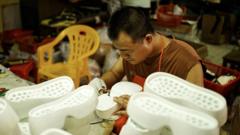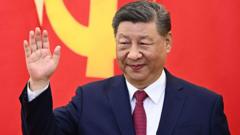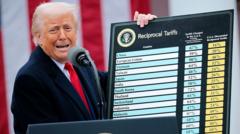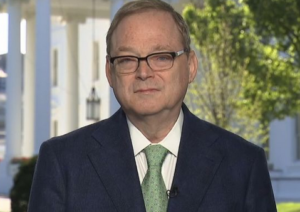**As China responds to intensified tariffs from the U.S., the global supply chain braces for potential shortages in critical components for various sectors.**
**China Halts Key Exports Amid U.S. Tariff Tensions**

**China Halts Key Exports Amid U.S. Tariff Tensions**
**Beijing pauses exports of vital rare earth minerals, stirring global industry concern.**
In a bold response to escalating U.S. tariffs, China has suspended the exports of essential rare earth minerals and magnets primarily used in the automotive, semiconductor, and aerospace industries. This significant decision comes as a direct countermeasure to President Trump’s recent increase in tariffs, making it more challenging for companies reliant on these materials. Currently, shipments from China can only proceed with special export licenses, a system that Beijing is still in the process of establishing, leaving industry leaders worried about impending shortages.
Compounding the challenges, the ongoing trade conflict has thrown global businesses into disarray, with no resolution in sight. The U.S. government has been anticipating a direct response from Chinese President Xi Jinping but remains hesitant about further engagements, given Xi’s unpredictable leadership style.
Meanwhile, Xi commences his weeklong tour through Southeast Asia, with his initial destination being Vietnam. The visit involves overseeing the signing of about 40 agreements aimed at enhancing economic ties, including arrangements for Chinese financing of significant infrastructural projects like an $8.3 billion railway linking Northern Vietnam to China.
In related trade developments, the Trump administration is contemplating new tariffs targeting computer chips just days after exempting various electronics. This uncertainty is causing many American consumers to stockpile goods in anticipation of rising prices. Treasury Secretary Scott Bessent has attempted to temper Trump's aggressive tariff strategies, while U.S. retailers must choose between absorbing increased costs or passing them on to consumers. The situation echoes the chaos of Brexit and raises parallels about trade tensions faced by Taiwan’s smaller exporters.
As the trade war continues to escalate, it remains to be seen how both nations will navigate this complex economic battleground, and what it may mean for global supply chains moving forward.
Compounding the challenges, the ongoing trade conflict has thrown global businesses into disarray, with no resolution in sight. The U.S. government has been anticipating a direct response from Chinese President Xi Jinping but remains hesitant about further engagements, given Xi’s unpredictable leadership style.
Meanwhile, Xi commences his weeklong tour through Southeast Asia, with his initial destination being Vietnam. The visit involves overseeing the signing of about 40 agreements aimed at enhancing economic ties, including arrangements for Chinese financing of significant infrastructural projects like an $8.3 billion railway linking Northern Vietnam to China.
In related trade developments, the Trump administration is contemplating new tariffs targeting computer chips just days after exempting various electronics. This uncertainty is causing many American consumers to stockpile goods in anticipation of rising prices. Treasury Secretary Scott Bessent has attempted to temper Trump's aggressive tariff strategies, while U.S. retailers must choose between absorbing increased costs or passing them on to consumers. The situation echoes the chaos of Brexit and raises parallels about trade tensions faced by Taiwan’s smaller exporters.
As the trade war continues to escalate, it remains to be seen how both nations will navigate this complex economic battleground, and what it may mean for global supply chains moving forward.






















